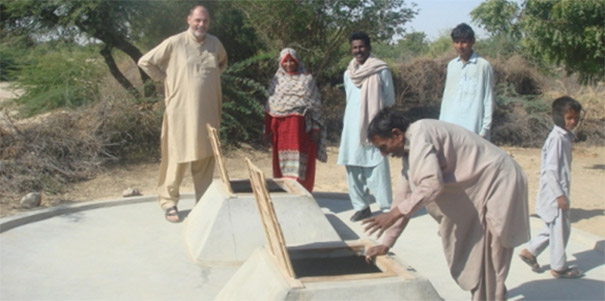
Fr. Tomas King and villagers welcome the completion of a vital new water storage tank. Photo: Fr. King.
This blog has been adapted from a piece in the March/April edition of the Columban Mission magazine.
Pope Francis in Laudato Si’ endorses the science that says human activity is a major contribution to the ecological crisis facing planet Earth.
“A very solid scientific consensus indicates that we are presently witnessing a disturbing warming of the climatic system … The problem is aggravated by a model of development based on the intensive use of fossil fuels, which is at the heart of the worldwide energy system … We know that technology based on the use of highly polluting fossil fuels – especially coal .. needs to be progressively replaced without delay … Access to safe drinkable water is a basic and universal human right, since it is essential to human survival and, as such, is a condition for the exercise of other human rights … ”
In various parts of Pakistan, global warming impacts everyday life. In over a decade, the country and its people have witnessed, firsthand, the devastating effects of climate change. Severe flooding has increased, displacing millions, while other districts like Thar Parkar Desert suffered severe droughts.
The Thar Parkar Desert, situated in Sindh province in south east Pakistan covers an area of 22,000 square kilometres with an estimated population of 1.5 million. One of the most densely populated deserts of the world, it is a place of beauty, especially after the monsoon rains; that is, when the rains come.
It has an interesting geology. Red granite hills with deep gorges are home to a rich variety of flora and fauna. The area is host to gum trees, which provides the resin from which incense is made. An estimated seventy per cent of these have dried up, because mafias use poisonous chemicals to speed up the process of extraction so as to sell greater quantities of resin in big city markets. White ‘china’ clay deposits in the area are also being mined.
But for the most part, Thar Parkar is an arid and semi arid desert. Crop production depends on the cyclical monsoon rains from mid-June to mid-August. The land is fertile when sufficient rains fall, but for the last ten years, the rains have been inconsistent, resulting in drought. This has forced many people to migrate to interior Sindh in search of work, food and water.
A heat wave in the summer of 2015 killed thousands of people. Indications are that this summer will be just as severe and destructive. Thousands of livestock – vital to the economy of the desert people – also died.
Underneath the sands of the Thar Parkar, massive amounts of coal have been found. But lack of water is a serious problem in this area. Small dams and reservoirs are being built by the government and some NGOs to capture and store rainwater, when it does fall. Studies reveal the existence of ground water in aquifer zones at varying depths – including in the areas where coal is located. Some of this water is harvested through digging deep tube-wells for drinking and household use.
What will happen to this water when the coal mining begins? For the mining itself massive amounts of water will be necessary.
Pakistan produces insufficient power to provide electricity for all its peoples’ needs. Power cuts are a part of daily life, where electricity is cut off for hours on end every day, particularly the hot summer months when the increased demand is not met.
In such a context, the discovery of coal under the sands of Thar Parkar Desert has the potential to end load shedding and provide for all of Pakistan’s energy needs for generations to come. But at what cost to the desert environment and its people today, and to future generations? Coal extraction will increase climate change – already been felt in the more prolonged droughts in the Thar Parkar Desert, as well as the heavier monsoons and increased flooding in recent years in other parts of the country. Extraction will also contaminate water.
The government and some mining companies, including a Chinese company, have begun the process of extracting the coal. China’s presence reinforces its policy of seeking out natural resources from virtually anywhere in the world to feed its own domestic needs.
What I describe here is a microcosm of the challenge facing humanity: How to provide the energy necessary while decreasing the dependency on fossil fuels? The government of Pakistan is still not serious about renewable energy. The future of the planet cannot tolerate the extraction of the vast quantities of coal in Thar Parkar Desert and other locations around the world as it will exacerbate global warming and climate change. This also highlights the extent of the change of heart and lifestyle necessary to turn things around.
A member of the Missionary Society of St. Columban, Fr. Tomas King has lived and served in Pakistan for over twenty years, mostly in the southern Sindh province.
